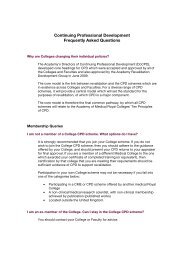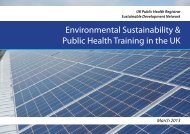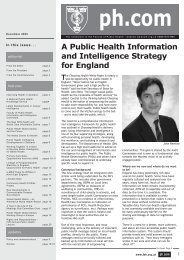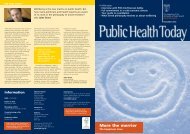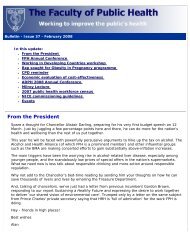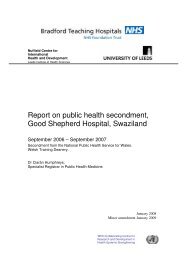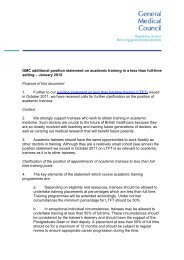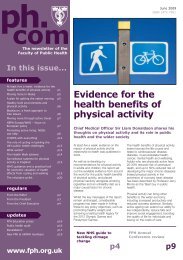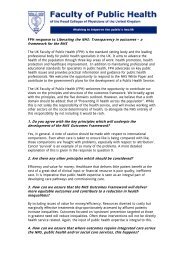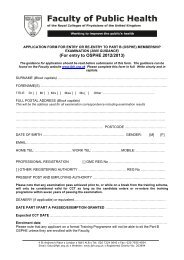A Chronology of State Medicine, Public Health, Welfare and Related ...
A Chronology of State Medicine, Public Health, Welfare and Related ...
A Chronology of State Medicine, Public Health, Welfare and Related ...
Create successful ePaper yourself
Turn your PDF publications into a flip-book with our unique Google optimized e-Paper software.
emoval <strong>of</strong> house refuse. See 1870.<br />
Artizans <strong>and</strong> Labourers' Dwellings Act (31&32 Vict., c.130) (Torrens Act) empowered<br />
local authorities to compel owners to demolish or repair insanitary dwellings, <strong>and</strong> to keep<br />
their properties in a habitable state. This was the first national legislation to tackle slum<br />
dwellings, although action was limited by legal procedures <strong>and</strong> the high compensation<br />
involved. Previously some action had been taken under local acts. See 1875.<br />
Pharmacy Act (31&32 Vict., c.121) limited the sale <strong>of</strong> opium to qualified pharmacists<br />
<strong>and</strong> legally registered chemists, <strong>and</strong> amended the 1852 act. See 1933.<br />
1868 Cont - 1869<br />
1868 cont Capital Punishment within Prisons Act (31&32 Vict., c.24) prohibited public<br />
executions.<br />
<strong>Public</strong> Schools Act (31&32 Vict., c.118) concerned with the governance <strong>of</strong> Eton,<br />
Winchester, Charterhouse, Harrow, Rugby <strong>and</strong> Shrewsbury schools; <strong>and</strong> provided for the<br />
adaptation <strong>of</strong> their original charters to meet new circumstances. See 1869.<br />
The Taunton Commission on secondary education, recognising the lack <strong>of</strong> grammar<br />
schools in many towns, recommended the establishment <strong>of</strong> rate-aided secondary schools, <strong>and</strong><br />
the need for secondary education for girls<br />
First report <strong>of</strong> the Royal Commission on the Employment <strong>of</strong> Children, Young Persons<br />
<strong>and</strong> Women in Agriculture published.<br />
Following representations from the British Medical Association the General Medical<br />
Council appointed a <strong>State</strong> <strong>Medicine</strong> Committee "to inquire into the proper steps to be taken,<br />
if any, for granting Diplomas or Certificates <strong>of</strong> pr<strong>of</strong>iciency in <strong>State</strong> <strong>Medicine</strong> <strong>and</strong> for<br />
recording the same in the Medical Register". See 1871.<br />
<strong>State</strong> <strong>Medicine</strong> became one <strong>of</strong> the four subjects accepted for the MD degree by<br />
Cambridge University.<br />
Association <strong>of</strong> Certifying Medical Officers <strong>of</strong> Great Britain <strong>and</strong> Irel<strong>and</strong> formed, with<br />
JT Arlidge (1822-99, physician at the North Staffordshire Infirmary) as president. See 1892.<br />
British <strong>and</strong> Foreign Blind Association (later, Royal National Institute for the Blind)<br />
formed.<br />
Manchester appointed its first medical <strong>of</strong>ficer <strong>of</strong> health.<br />
First annual meeting <strong>of</strong> the Trades Union Council was held in Manchester.<br />
In his Eleventh Annual Report in 1868 Simon declared that the state was now playing a<br />
vital role in preventive medicine: “It has interfered between parent <strong>and</strong> child, not only in<br />
imposing limitations on industrial uses <strong>of</strong> children, but also to the extent <strong>of</strong> requiring that<br />
children should not be left unvaccinated. It has interfered between employer <strong>and</strong> employed,<br />
to the extent <strong>of</strong> insisting, in the interests <strong>of</strong> the latter, that certain sanitary claims shall be<br />
fulfilled in all places <strong>of</strong> industrial occupation. It has interfered between vendor <strong>and</strong> purchaser;<br />
has put restrictions on the sale <strong>and</strong> purchase <strong>of</strong> poisons, has prohibited in certain cases certain<br />
commercial supplies <strong>of</strong> water, <strong>and</strong> has made it a public <strong>of</strong>fence to sell adulterated food or<br />
drink or medicine, or to <strong>of</strong>fer for sale any meat unfit for human food. Its care for the<br />
treatment <strong>of</strong> disease has not been unconditionally limited to treating at the public expense<br />
such sickness as may accompany destitution: it has provided that in any sort <strong>of</strong> epidemic<br />
emergency organized medical assistance, not peculiarly for paupers, may be required <strong>of</strong> local<br />
authorities; <strong>and</strong> in the same spirit it requires that vaccination at the public cost shall be given<br />
gratuitously to every claimant.”(Quoted in Anthony S Wohl, “Endangered Lives, <strong>Public</strong><br />
<strong>Health</strong> in Victorian Britain”, London, Methuen University Paperback, 1984, page 158.)<br />
1869 Municipal Franchise Act (32&33 Vict., c.55) shortened the term <strong>of</strong> residence required



